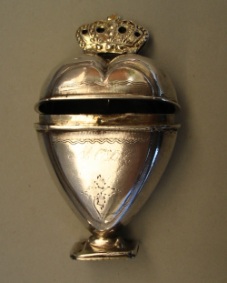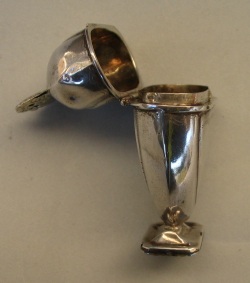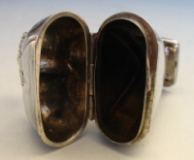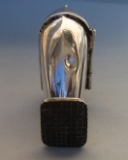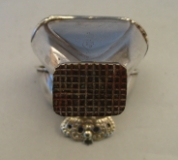|
A Scandinavian silver Hovedvandsæg
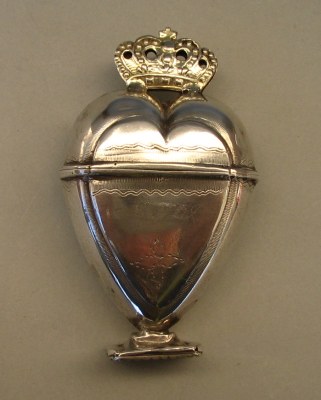 it was with this type of spice box from Scandinavia that a
young man indicated his intentions by presenting a 'hovedvandsæg'
to the young lady of his choice ('luktevannshus' in
Norway).
it was with this type of spice box from Scandinavia that a
young man indicated his intentions by presenting a 'hovedvandsæg'
to the young lady of his choice ('luktevannshus' in
Norway).
It literally means 'head-water egg' i.e. an 'egg' to
contain 'water' to revive the senses.
It is the successor of the pomander and should also be called
'vinaigrette', since it was used for smelling salts or
aromatic vinegar.
Large numbers of these containers, in a variety of styles, date
from the 18th into the latter part of the 19th century and are
often personalised with pin pricked initials and a date.
'Hovedvandsæg' are of various forms from about 1725. The
earlier ones are heart shaped and peculiarly are marked inside
at the top of the bottom half or inside the lid. Occasionally
above the lid is a semi precious stone held between two birds or
fishes. Sometimes they have a standing foot which opens,
sometimes just a foot and sometimes no foot.
Some Danes have large collections of 'Hovedvandsæg' and
there are entire books (mostly, or all, in Danish) on the
subject. Some localities have their own variations in style and
decoration.
This unmarked heart-shaped 'hovedvandsæg' has a gilded
crown on the top and stands on a base 'weighted' on the bottom
(the loading metal maintains traces of gilding).
It has a gilded interior, 18th century geometrical engraving
around the rim, flowers and the dedication MOPS on the front.
This 'hovedvandsæg' have any mark on it, therefore
it's impossible to determine place and/or date of origin.
It is 3 in. high (cm.7,5)
(information on 'hovedvandsæg' was directly supplied
by ASCAS members or obtained by Sigurd Schoubye's two-part
article 'Hovedvandsäg' in Silver Magazine, January and March
1990, and by Chr. A. BOJE's book 'DANSKE GULD OG SOLV
SMEDEMAERKER FOR 1870', pages 89, 99, 101 and 108, through the
kind support of Fred Sinfield and Hymie Dinerstein on
ASCAS Association website).
|
 ASSOCIATION OF SMALL COLLECTORS OF ANTIQUE SILVER
ASSOCIATION OF SMALL COLLECTORS OF ANTIQUE SILVER
